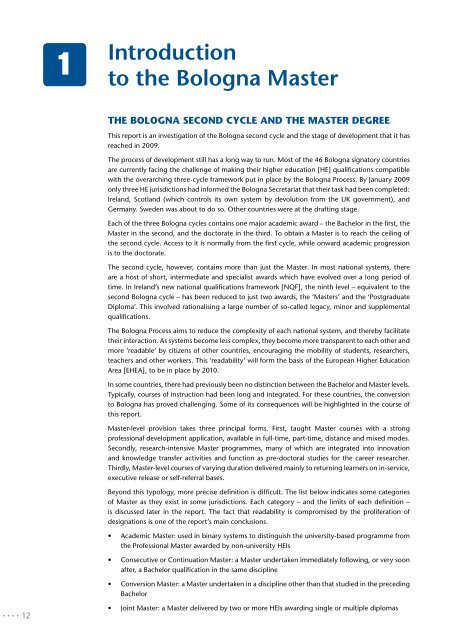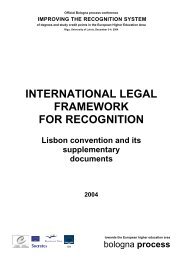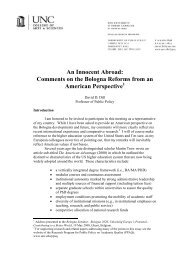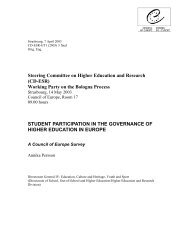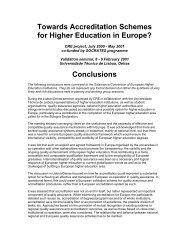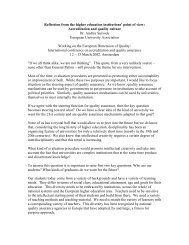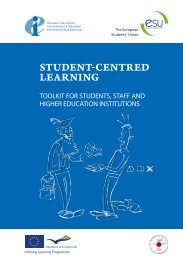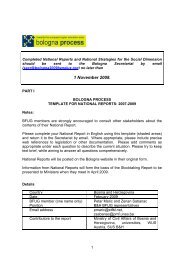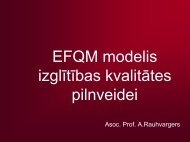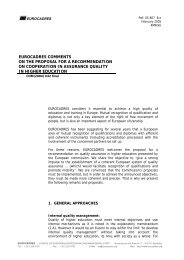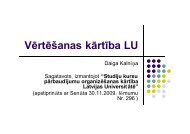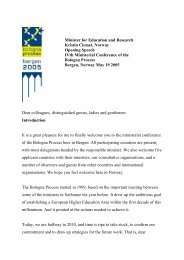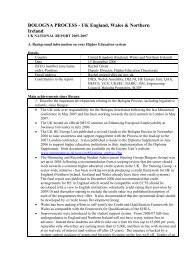EUA Survey Of Master Degrees In Europe - European University ...
EUA Survey Of Master Degrees In Europe - European University ...
EUA Survey Of Master Degrees In Europe - European University ...
You also want an ePaper? Increase the reach of your titles
YUMPU automatically turns print PDFs into web optimized ePapers that Google loves.
1<strong>In</strong>troductionto the Bologna <strong>Master</strong>The Bologna second cycle and the <strong>Master</strong> degreeThis report is an investigation of the Bologna second cycle and the stage of development that it hasreached in 2009.The process of development still has a long way to run. Most of the 46 Bologna signatory countriesare currently facing the challenge of making their higher education [HE] qualifications compatiblewith the overarching three-cycle framework put in place by the Bologna Process. By January 2009only three HE jurisdictions had informed the Bologna Secretariat that their task had been completed:Ireland, Scotland (which controls its own system by devolution from the UK government), andGermany. Sweden was about to do so. Other countries were at the drafting stage.Each of the three Bologna cycles contains one major academic award – the Bachelor in the first, the<strong>Master</strong> in the second, and the doctorate in the third. To obtain a <strong>Master</strong> is to reach the ceiling ofthe second cycle. Access to it is normally from the first cycle, while onward academic progressionis to the doctorate.The second cycle, however, contains more than just the <strong>Master</strong>. <strong>In</strong> most national systems, thereare a host of short, intermediate and specialist awards which have evolved over a long period oftime. <strong>In</strong> Ireland’s new national qualifications framework [NQF], the ninth level – equivalent to thesecond Bologna cycle – has been reduced to just two awards, the ‘<strong>Master</strong>s’ and the ‘PostgraduateDiploma’. This involved rationalising a large number of so-called legacy, minor and supplementalqualifications.The Bologna Process aims to reduce the complexity of each national system, and thereby facilitatetheir interaction. As systems become less complex, they become more transparent to each other andmore ‘readable’ by citizens of other countries, encouraging the mobility of students, researchers,teachers and other workers. This ‘readability’ will form the basis of the <strong>Europe</strong>an Higher EducationArea [EHEA], to be in place by 2010.<strong>In</strong> some countries, there had previously been no distinction between the Bachelor and <strong>Master</strong> levels.Typically, courses of instruction had been long and integrated. For these countries, the conversionto Bologna has proved challenging. Some of its consequences will be highlighted in the course ofthis report.<strong>Master</strong>-level provision takes three principal forms. First, taught <strong>Master</strong> courses with a strongprofessional development application, available in full-time, part-time, distance and mixed modes.Secondly, research-intensive <strong>Master</strong> programmes, many of which are integrated into innovationand knowledge transfer activities and function as pre-doctoral studies for the career researcher.Thirdly, <strong>Master</strong>-level courses of varying duration delivered mainly to returning learners on in-service,executive release or self-referral bases.Beyond this typology, more precise definition is difficult. The list below indicates some categoriesof <strong>Master</strong> as they exist in some jurisdictions. Each category – and the limits of each definition –is discussed later in the report. The fact that readability is compromised by the proliferation ofdesignations is one of the report’s main conclusions.• Academic <strong>Master</strong>: used in binary systems to distinguish the university-based programme fromthe Professional <strong>Master</strong> awarded by non-university HEIs• Consecutive or Continuation <strong>Master</strong>: a <strong>Master</strong> undertaken immediately following, or very soonafter, a Bachelor qualification in the same discipline• Conversion <strong>Master</strong>: a <strong>Master</strong> undertaken in a discipline other than that studied in the precedingBachelor12• Joint <strong>Master</strong>: a <strong>Master</strong> delivered by two or more HEIs awarding single or multiple diplomas


